The Plank Center for Leadership in Public Relations
Published on November 10, 2021 at 11:43 a.m.
by Faith Saucier.
The Plank Center for Leadership in Public Relations is an expert resource for public relations professionals, educators and students. The Center sponsors research, mentoring, national awards and service programs to advance the understanding and practice of responsible public relations. Established in 2005 by the University of Alabama Board of Trustees, the Center honors the late Betsy Plank, public relations leader and UA alumna — “the First Lady of PR.”
The Plank Center serves to develop and recognize outstanding, diverse public relations leaders, role models and mentors to advance ethical public relations in an evolving, global society.
The Center works to achieve its mission by:
- Advancing knowledge of leadership values and skills in the profession.
- Supporting research, teaching, service and professional educational efforts that help develop diverse and trustworthy leaders.
- Bridging the interests and vision of public relations practice and education.
- Collaborating with other groups and associations to elevate the standards of effective public relations.
The Plank Center Board of Advisors is comprised of public relations and communications professionals from across the United States, who come from diverse backgrounds and experiences. Its members are world-class academics and practitioners who provide counsel, direction and oversight to the Center regarding strategic plans and programs.
“Our imperative to cultivate strong leaders, inspire the next generation of public relations professionals and elevate the crucial essentials of the communications world has never been more important,” said Bridget Coffing, Plank Center Board of Advisors chair and retired senior vice president and chief communications officer of McDonald’s Corp. “The opportunity is clear, and the need to accelerate these efforts has never been more pronounced.”
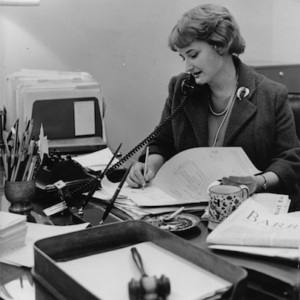
In support of its mission and following the values of Betsy Plank, The Plank Center offers mentorship and leadership opportunities to emerging public relations professionals and recognizes seasoned mentors who have made an impact in the field. The Center also provides resources and research surrounding the public relations industry and works to advance diversity, equity and inclusion in public relations.
“The Plank Center is an incredible derivative of the industry itself, meaning that it’s involved in ensuring the future of the profession,” said Plank Center Board Member and Real Chemistry Principal Gary Grates. “It [the Center] does so through a variety of different programming, policies and efforts aimed at making sure the next generation of public relations professionals are relevant; that their skill sets are in line with and reflect how the industry is progressing; and, that their attitudes and mindsets correlate with where the profession is going and where value is in what we do for a living.”
The Center recently celebrated its 15th anniversary. In the years ahead, it will focus on expanding its reach and impact as a credible, expert resource for the public relations profession. So, what’s next for the Center?
“For us, it’s making sure that what we’re doing is additive to where the future is,” said Grates. “If we have to constantly modify, upgrade or evolve our mentoring; if we have to look at some of our developmental efforts and take them to the next level; if we have to look at new and different partnerships with institutions to help propel how the profession is seen, used, valued and measured; those are the things that have to continue.”
Coffing agreed. “At The Plank Center, we are blessed with a tremendous community of professionals who share the same commitment and passion for our business and the men and women who will form and lead its future. Our goal is to make sure the future builds on the best of our past, and looks even better than today,” said Coffing.
“That’s what gives all of us who are a part of The Plank Center a reason for optimism and excitement,” said Grates.
Betsy Plank
The First Lady of PR and the values that keep us going
“Public relations, practiced at its best, is a proud, powerful and responsible profession.” — Betsy Plank
Betsy Plank: PR pioneer, champion of PR education and the First Lady of PR. A distinctly well-known leader, professional and mentor who broke glass ceilings and gave 60 years of her life to the public relations profession.
This is her legacy.
A 1944 graduate of The University of Alabama, Betsy Plank attained national and international stature during a distinguished career in corporate and agency public relations. She earned countless industry accolades and achieved multiple firsts for women, being the first to head a division of Illinois Bell, and as president of the Publicity Club of Chicago and the Public Relations Society of America (PRSA). She received three of PRSA’s top individual honors: The Gold Anvil Award (1977), the Paul M. Lund Public Service Award (1989), and the Patrick Jackson Award for Distinguished Service to PRSA (2001). 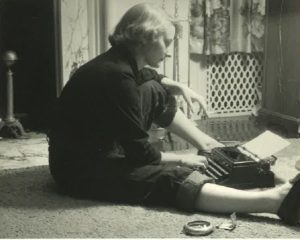
She served as executive vice president of Daniel J. Edelman (now Edelman), before becoming director of public relations planning at AT&T and later director of external affairs at Illinois Bell.
In addition to her many personal accomplishments, Plank devoted much of her time to advancing public relations education, consistently and passionately advocating for the profession’s students. She played a central role in the establishment of the Public Relations Student Society of America (PRSSA) in 1967 and co-chaired a national commission to develop guidelines for undergraduate public relations curricula.
“Betsy was never someone who was above anyone else. She always put herself at a level where she felt a kinship with people,” said Keith Burton, past Plank board chair and owner of Grayson Emmett Partners. “She was vibrant through all of these things and an incredible leader who never led through some overwhelming presence; it was through her humility and charm that she led.”
Betsy’s influence on the public relations industry runs far and wide. Throughout her career, she emphasized the need for ethics, integrity and truth in public relations. After the establishment of The Plank Center in 2005, “what was on Betsy’s mind and what she talked about was that the profession had lost sight of ethics and integrity,” said Burton.
“She was the one who really brought ethical practice and integrity to the forefront of the conversations when she led PRSA, but also when she thought about the work we needed to be doing.”
Betsy loved and believed in the fundamentals of the profession: being a strong writer, working with integrity and ethics, and knowing your craft at the very highest level. However, she put people first. “She (Betsy) was always interested in you as a person first and as a practitioner second. That’s the way she operated,” said Burton.
Betsy’s legacy lives on today and is most visible in the countless public relations professionals, educators and students who credit her with taking the time to mentor them throughout her career. Her focus on others led her to become the most individually recognized woman in the industry, a testament to the value of selflessness in professionalism.
Betsy’s focus on emerging leaders, PR students and young people was always a priority and became translated into The Plank Center for Leadership in Public Relations. Through the years, the Center has very carefully and thoughtfully selected advisors who emulate the qualities of Betsy. According to Burton, when choosing board members, the Center “looks for people who have humility, who have a gift for giving of themselves, who have tremendous leadership — more than just simply directing a team but leading through their personality, emotional intelligence and who they are — all of those things.”
“That’s what Betsy Plank brought to us,” said Burton. “She would be very proud of the growth of the Center. While we’ll always have the Center at Alabama, we’ve broadened our geographies so we can help many other practitioners, honor many other people and help students who are coming up.”
Research
Projects to inform effective practice
The Plank Center participates in and hosts multiple research projects each year. Part of the Center’s mission is to help bridge the gap between public relations education and practice, and to emphasize the importance of research surrounding leadership, mentorship and diversity, equity and inclusion in public relations.
“Research and public relations, especially in today’s profession, are absolutely intertwined and closely related in so many ways,” said Dr. Juan Meng, Plank Center board member and associate professor of public relations at the University of Georgia. “Research is particularly important for the profession and, just as well, for us educators to do research, teach research, and readdress the role of research in informing effective practice.”
Elina Viktornova Erzikova, Plank Center fellow and professor of public relations at Central Michigan University, agreed. “We should conduct research that matters for public relations,” said Erzikova. “Our mission should be helping the industry become better through incorporating our academic research’s results into the practice.”
According to Dr. Bryan Reber, Plank board member and advertising and public relations department head at the University of Georgia, any academic research in public relations needs to be linked to practice. Researchers want statistical analysis that is important for academic publications; however, they should also strive to contribute and help practitioners know better ways to improve their jobs.
“One of the biggest strengths of The Plank Center is high-quality research at the international level and global level.” — Dr. Juan Meng
The North American Communication Monitor (NACM) is one main research project sponsored by the Center, the first survey of its kind in North America to explore the status quo, qualities and trends of communication management practice in Canada and the United States.
The NACM is led by five professors from universities affiliated with The Plank Center: Drs. Juan Meng and Bryan H. Reber, University of Georgia; Drs. Bruce Berger and Karla K. Gower, University of Alabama; and Dr. Ansgar Zerfass, Leipzig University in Germany.
“We already had the European, Asian Pacific and Latin American communication monitors,” said Meng. “The North American part — which has the largest side of the PR industry compared to any other countries — really makes sense and makes a great contribution if we have that missing piece, which can fit into the global picture.”
According to the 2020-21 NACM report, communications professionals trusted public health officials and organizations more than any other type of source for COVID-19 information. According to Drs. Reber and Meng, this statistic speaks to the importance of where communications professionals get their information and how they share it with others.
“Especially in the past two years, the double pandemic — the virus and the racial reckoning — really add on to the role of accurate information,” said Meng. “It’s important to find that communications professionals use reliable sources to deliver information to other groups that they are representing or responsible for sharing information to. This really established the scientifically driven background, or evidence, that every piece of communication shall be built based upon facts, truth, and a reliable source or third party, before we contribute it to the public discourse.”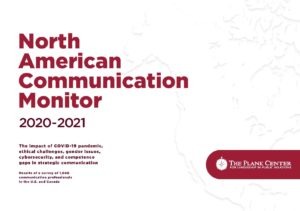
Dr. Reber stated that trust is a key player in the role of public relations practitioners, and trusted sources are particularly relevant. “Trust is important and internal communications is important,” said Reber. “Understanding how to best communicate with employees and other internal stakeholders is key, and that links back to trusted sources.”
Both Drs. Reber and Meng emphasized the importance and value of communication during the last few years and highlighted the important role that The Plank Center has played in bridging the gap between public relations education and practice. “The value of communication has been front and center,” said Reber. “The Plank Center has helped to improve the conversation between academia and the world of practice. It’s helped facilitate more understanding of and interest in research. It ties the two closer together in most of the things that we do.”
Erzikova noted that The Plank Center has been and will continue to be an extremely important resource for those conducting research in public relations. “The Center has provided guidance, inspiration and financial support to dozens, if not hundreds, of researchers like myself,” said Erzikova. “Public relations is a global phenomenon, and we should assure nation-specific practices are studied and popularized. It takes a village to raise a child. It takes a ‘village’ of researchers to help improve the practice through insights and takeaways.”
The NACM offers value in its own way to the public relations and communications industries, and will continue to provide valuable, data-driven results and solutions to professionals around the world.
Mentoring
The Milestones in Mentoring Awards and what mentors mean to The Plank Center
Each year, The Plank Center recognizes and promotes the critical role mentors play in helping to develop leaders and advance the public relations profession. In 2010, the Center established the “Milestones in Mentoring Awards” to honor leaders throughout the profession who, by word and deed, have demonstrated a superior commitment to mentoring others and accelerating the success of others in the field.
Part of The Plank Center’s mission is to honor mentors and build mentor-mentee relationships. Members of The Plank Center Board recognize that mentoring is a key catalyst in the advancement of the public relations profession. “What mentoring does is make sure that it’s not just a handful of people at the top or middle of the organization, but rather everyone coming into the organization realizes that we have to help others become as good as they possibly can be in order to continue raising the level of competency and passion about this profession,” said Ron Culp, Plank board member and professional director of the advertising and public relations M.A. program at DePaul University.
The Plank Center’s annual Milestones in Mentoring Gala honors the legacies of those who have made an incredible impact on others. The event brings students, practitioners and academics together for a night of celebration and networking. Students in attendance have the opportunity to meet some of the most influential professionals in the public relations industry.
“A lot of students and even people who start out early in their careers have had a great education and maybe a series of PR programs and college mentors,” said Culp. “But as we do at this event, we will make sure that the senior people in our profession are meeting the students.”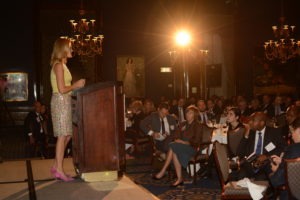
Senior professionals such as Harold Burson and Al Golin were in attendance at the first Milestones Gala. While attending, both put a heavy emphasis on students: “Those senior pillars in the PR world were laser focused on what this event was about, and they set an example and set the tone for future events,” said Culp. “They recognized, at their senior age, that this profession relies on who they were talking to, not those veterans in the room who already knew them.”
In its beginning, the Milestones in Mentoring Gala was a one-time event. Culp, a co-chair of the event, noted that the feedback from the first gala was too positive not to continue. “The first program just came out and grabbed everyone in the group,” said Culp. “The lucky 300 people in the room felt that it [the event] really underscored the value of the mentor relationship with mentees.”
The program is rewarding for all participants. Mentees introduce mentors who receive awards, and “five of those introductions in an evening turns it into an inspiring event that really helps advance the profession and a recognition of the importance of being a mentor,” said Culp.
After the initial gala, board members convened and decided to make it an annual event because the feedback was so universally positive. Culp noted that “[i]t was Jack Koten who said, ‘We can’t just make this a one-time deal. This is so good that we have to do it again.’”
Over a decade later, the 11th annual Milestones in Mentoring Program continues to honor mentors who have made an impact on this profession and its people. “It’s a unique event,” said Culp. “The public relations profession honors great, creative work, agency of the year and all of those things.
“We honor the people who have made a commitment and personally delivered day in and day out on their values and mission to be
great mentors.” — Ron Culp
Emerging Leaders
The Emerging Leaders Certificate Program, Having a voice at the table
The Plank Center is committed to helping students and young professionals develop their skills and advance the public relations profession. The Center has an Emerging Leaders Committee that is dedicated to nurturing young leaders across multiple industries throughout the United States.
“The Emerging Leaders Committee serves as a liaison between The Plank Center and anyone who’s in the early stages of their careers,” said Leah Seay, chair of the Emerging Leaders Committee and delivery communications manager at Uber. “A lot of our members are very passionate about The Plank Center and Betsy Plank and the work that she did. We all essentially serve as ambassadors to The Plank Center in our workplaces and out in the communities that we serve.”
Members of the Emerging Leaders Committee support each other and additional colleagues to become more competent, ethical and transformational leaders. “They are by far some of the smartest and brightest PR professionals that I’ve had the opportunity to work with,” said Seay. “No one is ever afraid to challenge thoughts or beliefs. We are passionate about advancing the PR profession.”
In support of The Plank Center’s mission, each member of the Emerging Leaders Committee sits on at least one other Plank committee. As members of these committees, each young leader “provides a voice to make sure that The Plank Center’s priorities are aligned and that younger professionals have a seat and voice at the table,” said Seay.
The Emerging Leaders Committee provides resource guides to young professionals, offering frameworks that support leadership and research in public relations. The committee’s most recent guide, titled “Making Your Next Big Move,” is applicable to anyone in any stage of their career, according to Seay. “Whether you are in your first year of working or someone who’s a little more seasoned and has a little more experience, this guide is really for anyone,” said Seay. “It takes the reader on a journey through everything they would need to know about making a move in their career.”
The guide walks readers through how to assess the different types of moves and weighing their options. Other guides, such as “Mastering Leadership at Middle Levels” and “Lead with Purpose,” also offer tactical, skill-based solutions for young professionals and students.
This year, The Plank Center is launching its Emerging Leaders Certificate Program. Bruce Berger, founding director of The Plank Center and professor emeritus of advertising and public relations at The University of Alabama, explained this program further: “The Emerging Leaders Certificate Program is an online, on-demand program that has nine modules that deal with nine vital leadership skills: self-awareness and self-reflection, empathy, emotional IQ, active listening, critical thinking, managing relationships, teams and culture, social awareness, conflict management and business essentials.”
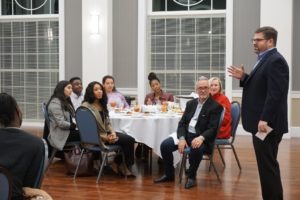 Berger believes that each of these skills is applicable on the job and in life. “If we become better listeners as people; if we are more empathetic in our relationships with others; if we self-reflect and talk honestly to ourselves about our performance and how we interact with others, we become better people,” said Berger. “These skills provide not only a basis for professional movement, but for personal understanding and growth, which is part of leadership.”
Berger believes that each of these skills is applicable on the job and in life. “If we become better listeners as people; if we are more empathetic in our relationships with others; if we self-reflect and talk honestly to ourselves about our performance and how we interact with others, we become better people,” said Berger. “These skills provide not only a basis for professional movement, but for personal understanding and growth, which is part of leadership.”
According to Berger, these skills are at the heart of what research shows is excellent leadership. “They’re the difference makers between good leadership and great leadership,” said Berger.
Erzikova noted that Dr. Berger has been a “trend-setter” with research in public relations. “Many years ago, he [Dr. Berger] was among the first academics who saw the value of PR leadership research,” said Erzikova. “These days, Dr. Berger is spurring research on self-reflection, and based on what we have found so far, self-reflection, indeed, can be a transformative experience that improves critical thinking and decision-making, helps boost confidence and build meaningful relationships.”
Also in the works for the Emerging Leaders Committee is the “Emerging Voices” LinkedIn group, a platform and community for emerging voices to network and share resources and stories. For Seay and the committee, this project is exciting. “One of the things that our emerging leaders have realized is that it’s very easy when you’re in college to remain plugged in or learn how to network,” said Seay. “But, once you’ve become a young professional, it can be challenging to figure out ways to meet new individuals and learn from them. We’re hoping that this group really serves as a community for people to build relationships and learn more about The Plank Center and the work that Betsy Plank did.”
As with the Emerging Voices group, young leaders must have and continue to fight for a voice and seat at the table. Seay believes that it’s an everyday fight. “Make sure that you are present in your organizations, that you have the right conversations horizontally and vertically, and that you champion others who are becoming leaders in the industry,” said Seay.
Diversity, Equity and Inclusion (DEI)
Guiding values for the advancement of the profession
The Plank Center recognizes that diversity is critical for individual empowerment and organizational success. We strive to enhance workplace environments that are representative of different races, ethnicities, gender identities, ages, cultures, languages, talent levels and values.
Each year, The Plank Center hosts a Diversity, Equity and Inclusion (DEI) Summit in conjunction with the Milestones in Mentoring Gala. The summit provides a forum for practitioners, educators and students to come together to discuss the crucial leadership and organizational issues surrounding DEI in public relations today. According to Dr. Nilanjana Bardhan, chair of The Plank Center’s DEI Committee and professor of communication studies at Southern Illinois University Carbondale, “this event is important for the PR field because DEI should be something we are thinking about all of the time anyway.”
“It’s like the financials of a company — we’re always thinking about it,” said Bardhan. “We can’t say, ‘Done, check mark,’ when it comes to DEI.”
Bardhan emphasized the connection required to communicate and build relationships with diverse groups of people and highlighted the importance of involvement in this area. “You have to be able to connect culturally and interculturally,” said Bardhan. “Our profession really needs to do a lot of work in this area. Everybody has to be involved; it can’t just be researchers doing the research, or a few people talking about it. This has to be all hands on deck — we have an issue here and we have to address it.”
The Plank Center’s DEI Committee serves as a link between education and industry and provides resources for students, professionals and educators alike. Bardhan noted that “[t]he goal for the DEI committee was and is to serve as a catalyst in not just the conversation and the research but also through our programming so we can help and work with other groups — professionals, educators, and students — in whatever way we can, within the scope of our overall mission of the Center, to advance DEI in the profession.”
To advance the work around DEI, The Plank Center holds programming events, workshops, seminars and webinars to connect educators, professionals and students and help develop their skill sets in these areas. The Center also offers scholarships for students to attend the DEI summit and provides research surrounding DEI each year. “Through all of these efforts,” said Bardhan, “we are trying to be a catalyst in moving the needle on DEI and helping bring about concrete change.”
Moving the DEI needle requires all of those in the PR industry to be involved. It also requires leaders who are adaptable, committed, authentic and genuine. “There’s plenty of research out there on leadership and DEI that shows that, unless leaders are directly, visibly and genuinely committed and involved in an organization’s DEI efforts, things don’t change,” said Bardhan. “We need more leaders involved, and The Plank Center helps with that.”
As far as DEI within The Plank Center, Bardhan noted that although the Center wasn’t very diverse in the beginning, it has done abundant work to change that. “Everybody on our board cares about making The Plank Center diverse,” said Bardhan. “And as a result, if you look at the composition of the board today, it’s just increasingly becoming more diverse.”
“Diversity is not only good for business; it’s the right thing to do and it’s good for business and creativity and all of those things. So, it’s really a win-win thing — if we do it right.” — Dr. Nilanjana Bardhan
The Plank Center’s DEI Committee has and will continue to operate as part of the fabric of everything the Center does. The Center will continue to provide resources and opportunities to students, educators and professionals to continue advancing DEI in the public relations profession.




